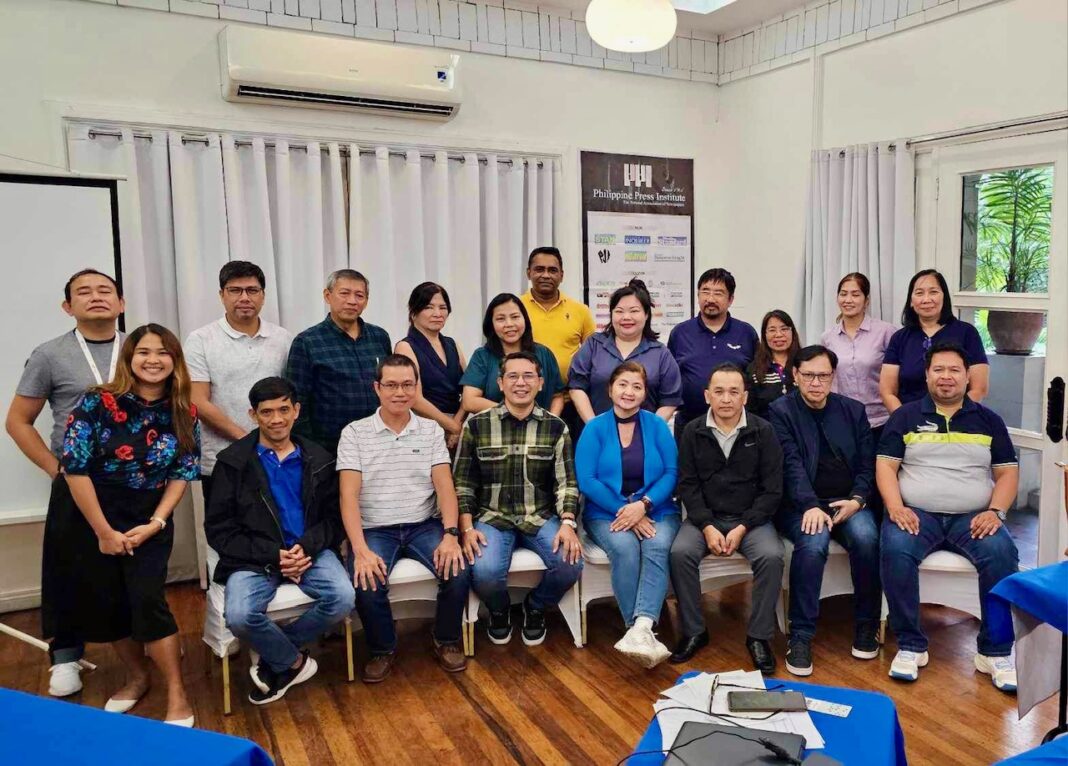
MANILA–The Philippine Media-Citizen Council composed of eight regional and provincial councils are establishing their own sets of Standard Operating Procedures (SOP) and Code of Conduct (CoC) to fulfill their work and role as mediator on work-related complaints against media members in their respective areas.
Guided and supported by the International Media Support (IMS) and the Philippine Press Institute (PPI), each of the eight regional media-citizen councils in the country through their respective presidents, chairpersons and other officers are tasked to formulate the SOP and CoC best suited in the media landscape in their regions and provinces.
Ranga Kalansooriya, Regional Adviser, Asia Pacific, IMS, who conducts lectures on Improving standards in journalism through effective regulation—Citizen’s Media Councils—Philippines on Feb. 16-18 at Orchid Garden Suites in Manila said among the most significant part of the SOP is to identify what types of complaints are mediatable and non-mediatable, who will accept and hear the complaints and the duration of the mediation.
It must also be cleared right in the beginning that the complaints are free and demands no payment and that both the two parties or all parties concerned in the complaint are willing to settle amicably and that they recognize the council to mediate.
The mediation can be through emails and or face to face talks.
Initially, as part of the SOP, the complaint must be submitted formally through email and or messenger but had not been earlier posted or has been a subject of talks and comments in the social media.
The complainants could either be victims of work-related offenses committed by the media member and even non-victims or a third party.
On the other hand, the complainant cannot demand a swift decision or set a deadline on the result of the mediation.
Also part of the SOP is a proof that the complaint was first brought to the attention of the desk officers or the newspaper organization of the subject of the complaint but was not given due attention.
However, while the respective media-citizen councils have their dynamics and distinct media landscape, there is also a uniformity in SOP’s and CoC’s. One of these is the duration of the mediation, from acceptance of the complaint to the decision in the complaint.
The media-citizen councils are composed respectively of media members and representations from different sectors in the community–farmers or the agriculture, business, academe, youth/students/Indigenous People, church, LGBTQ, transport and other sectors. The Integrated Bar of the Philippines (IBP) is the council’s legal component. The police, the military, the Commission on Human Rights and information officers of different government agencies are also support partners of the councils.
The PPI, through the initiative and expertise of its executive director Ariel Sebellino and the support of the IMS have been conducting initiative efforts to establish a nationwide media-citizen council to help protect and save media members from being charged of libel and other work-related cases in court while also providing stern reminders on the need for media responsibility and accountability.
Since 2021, there are already eight media-citizen councils that were put up in the country–the Iloilo Media-Citizen Council headed by its President and Chairperson Francis Allan Angelo, Batangas Media-Citizen Council headed by Joenald Medina Rayos; Davao Media-Citizen Council headed by Antonio Peralta; Aklan Media-Citizen Council headed by Jun N. Aguirre; Surigao Media-Citizen Council headed by Tirso Clerigo Jr.; Central Luzon Media-Citizen Council headed by Carmela Reyes-Estrope; Agusan del Sur Media-Citizen Council headed by Rey Suravazquez and Region 8 Media Citizen Council headed by Ricky Bautista.
The media-citizen council which is patterned to Cebu Citizens-Press Council that was initiated in 2001 but was formally launched in 2006 is a forum for media issues and for airing grievances based in Cebu City, Philippines. It aims to defend press freedom and promote professional journalism.
But the media-citizen council is a much broader spectrum because it includes all forms and avenues of media–broadcast, radio, online and digital media and not just print media.
Joyce Panares, training director of PPI and Che De Los Reyes, IMS Program Manager for the Philippines are also key speakers who provide guidelines and inspirations to all the councils during its respective orientation and organizational workshop, various ethical seminars and training, including Artificial Intelligence (AI), formal launching and induction of officers and other support activities.
Prof. Gary Mariano of the DE La Salle University and former chairman of the Cebu Citizen Press Council also provides key learning and guide principles, theories and best practices of a council in both protecting the media by upholding p0ress freedom but also making the media members aware of the legal consequences of their unprofessionalism and unethical practice.
Central Luzon Media-Citizen Council
The Central Luzon Media-Citizen Council (CLMCC) is composed of media members, both print and broadcast, (TV and radio), including online and digital and social media.
The following are its officers President/Chairperson Carmela Reyes-Estrope; Vice President/Vice Chairperson: Vic Vizcocho Jr.; Secretary: Rogie Pangilinan; Treasurer: Jason de Asis; Auditor: Dyan Grace Crespo / Erick Silverio and PRO: Aileen Sanchez.
The Board of Trustees or the Dispute Resolution Committee (DRC) is composed of the following: Chairman Atty Jo Clemente; Vice Chair Atty. Maria Imelda Quiambao-Tuazon; Secretary Atty. Gener Endona and Members: Atty. Alejandro Buan; Atty. Angelo Lopez; Nenita L. Carlos; Melicia DC Ciriaco; Mark Anthony Miranda and Ronilo Gines.

The Committees and their respective chair and vice chair are Grievance and Review Committee headed by Chair: Atty. Maria Imelda Quiambao-Tuazon and Co-Chair: Atty. Jo Clemente; the Membership Committee headed by Chair: Carmela Reyes- Estrope and Co-Chair: Melicia DC Ciriaco; The Ways and Means Committee headed by Chair: Benjamin Antonio III and Co-Chair: Vic Vizcocho Jr. and Nenita Carlos; the Social Media Engagement Committee headed by Chair: Aileen Sanchez Co-Chair: Erick Silverio and Mark Miranda and Election Committee headed by Chair: Atty. Alejandro Buan, Co-Chair: Atty. Angelo Lopez II and Diane Grace Crespo.






